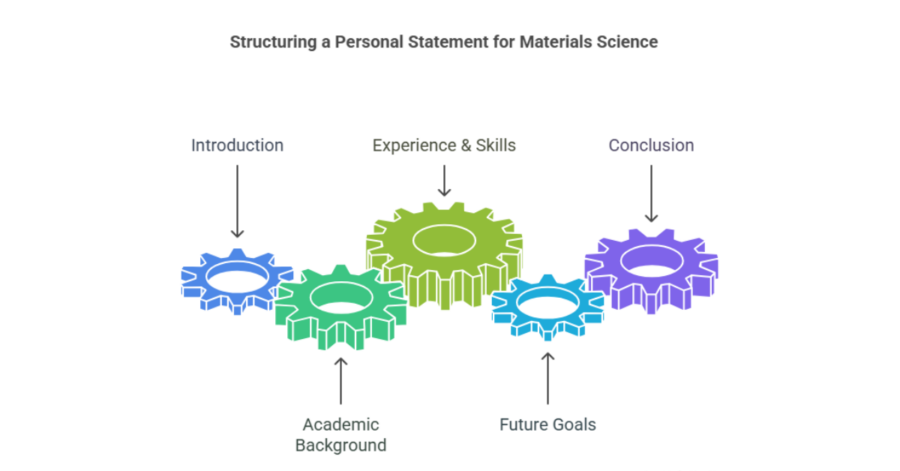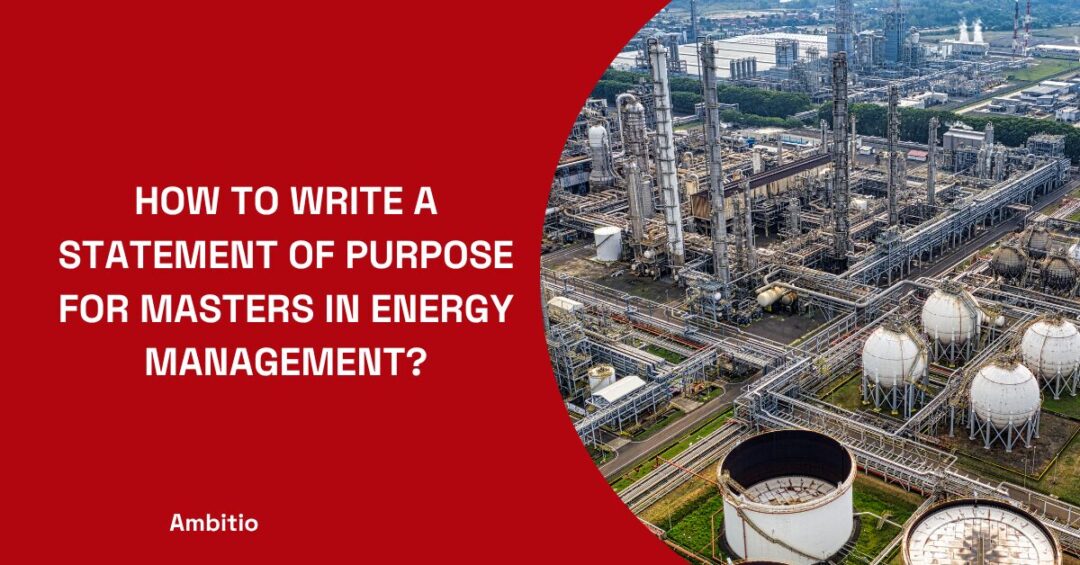8 May 2025
4 minutes read
How to Write a Winning Personal Statement for Masters in Materials Science Engineering for Indian Students?

Key Takeaways
- Personal statement for masters in materials science engineering should clearly reflect your passion, skills, and future goals.
- Top global universities seek structured, honest statements that show real-world application of your knowledge.
- Avoid clichés—be authentic, concise, and consider using Ambitio for expert guidance.
“Stuff matters” That’s what materials scientist Mark Miodownik said—and he’s right. From carbon composites in aerospace to nanotechnology in defense, materials science and engineering is where real innovation begins. But writing a personal statement for masters in materials science engineering? That’s where most brilliant minds freeze.
You’re not alone if your passion for physics, chemistry, and creating new materials doesn’t translate easily into words. Many applicants struggle to reflect their curiosity, work experience, and ambition in a way that actually impresses admissions tutors at top universities like Oxford or Imperial College. This guide? It’s here to help you succeed logically, honestly, and insightfully.
Why Your Personal Statement Matters for a Masters in Materials Science Engineering?
A personal statement for masters in materials science engineering is more than just a UCAS requirement, it’s your chance to showcase the aptitude, enthusiasm, and aspiration that grades alone can’t reflect. Admissions tutors want to know what fascinates you about subjects like physics and chemistry, and how you’ve applied that interest in materials science through internships, extracurricular activities, or even sport, where teamwork and discipline emerge naturally.

Whether you want to study materials science to work in renewable energy, electronic manufacturing, or an international engineering company, your statement helps determine if you’re ready for the challenge. It should reflect how you enjoy solving scientific problems, using math, mechanics, and insights from real-world engineering to improve structure, conductivity, or electrical efficiency. A strong personal statement highlights how you’ve used every relevant experience; be it academic awards, CREST projects, or rural outreach programmes to prepare for this technological discipline, and how you’ll utilise the course to achieve, not just apply.
Key Elements to Include in Your Personal Statement for Material Engineering
A strong personal statement for a Master’s in Materials Science and Engineering should highlight your passion, relevant experience, and alignment with the program’s offerings. Emphasize your understanding of the interdisciplinary nature of the field and your ability to contribute to research and innovation. Show how your skills in materials science can drive future technological advancements and address real-world challenges.
When writing your personal statement for masters in materials science engineering, make sure it reflects a clear desire to learn and contribute to innovative uses of technology. Highlight specific instances from your undergraduate journey where you explored material properties, developed solutions, or competed in science or engineering competitions. Show how you applied theoretical knowledge practically, perhaps through labs, research, or supplementary projects.

Admissions committees want to see your ability to work in teams, your integrity (avoid plagiarism), and how you’ve prepared for academia through guidance or mentorship. Mention any offers received, quality of work, and your commitment to continuous improvement. And whilst writing, remember to participate in shaping your own story—ideally demonstrating how you’ll use this degree to innovate in areas like electricity or materials development.
Structuring Your Personal Statement for Maximum Impact
A well-structured personal statement for masters in materials science engineering can be the reason you stand out and receive offers from top universities. It should flow logically, showcase your journey, and ideally reflect both your academic grounding and your personal drive. Here’s how to structure it for maximum impact:
- Introduction: Start with what sparked your interest in materials science and your motivation to pursue this field.
- Academic Background: Highlight your undergraduate studies and relevant coursework.
- Experience & Skills: Mention internships, competition wins, research projects, and ability to work in a team.
- Future Goals: Explain how this course fits your aspirations and where you see yourself contributing.
- Conclusion: End with a confident reflection on why you’re ready—and excited—to begin this journey.
Common Mistakes to Avoid When Writing Your Statement
When crafting your personal statement for masters in materials science engineering, avoid these common pitfalls:
- Being too generic: Vague goals or clichéd phrases won’t stand out.
- Overloading with jargon: Keep it clear and accessible, not overly technical.
- Lack of structure: A disorganized statement is hard to follow.
- Ignoring authenticity: Don’t exaggerate or include anything untrue—it shows.
- Forgetting proofreading: Typos or sloppy writing can hurt your credibility.
10 Top Universities to Study Masters in Materials Science and Engineering
Did you know that the global materials science and engineering market is projected to exceed $1 trillion by 2030? With advanced materials playing a critical role in fields like nanotechnology, automotive, and electronics, a Master’s in Material Science and Engineering from a top university can open doors to high-impact, high-paying careers.
Below is a comparison of top universities offering this program:
| University | Average Tuition Fees (per year) | Average Salary (per year) | Exams Required |
|---|---|---|---|
| Massachusetts Institute of Technology (MIT) | $55,510 | $105,000 | GRE, TOEFL/IELTS |
| Stanford University | $58,746 | $102,000 | GRE (optional), TOEFL/IELTS |
| University of California, Berkeley | $27,000 (in-state), $43,000 (out) | $95,000 | GRE (optional), TOEFL/IELTS |
| University of Cambridge | £38,000 (~$48,000) | $90,000 | IELTS/TOEFL |
| ETH Zurich | CHF 1,298 (~$1,500) | $85,000 | IELTS/TOEFL |
| University of Oxford | £39,000 (~$49,000) | $88,000 | IELTS/TOEFL |
| National University of Singapore (NUS) | SGD 38,000 (~$28,000) | $80,000 | GRE, TOEFL/IELTS |
| Georgia Institute of Technology | $29,000 (out-of-state) | $90,000 | GRE (optional), TOEFL/IELTS |
| Tsinghua University | ¥30,000 (~$4,200) | $78,000 | TOEFL/IELTS |
| University of Tokyo | ¥535,800 (~$3,800) | $76,000 | TOEFL/IELTS |
Conclusion
A strong personal statement for masters in materials science engineering is your opportunity to present your journey, goals, and readiness for advanced study in a compelling way. It’s not just about listing achievements, it’s about connecting your experiences with your future aspirations in the field.
If you’re unsure where to begin or want expert guidance to refine your draft, Ambitio is here to help. Our mentors and AI tools can support you in crafting a standout personal statement tailored to your dream program. Don’t leave your future to chance. Start building your best application with Ambitio Elite today.
FAQs
What is a personal statement?
A personal statement is an essay showcasing your motivations, experiences, and suitability for the program.
Why is the Personal Statement for Masters in Materials Science and Engineering important?
Personal Statement for Masters in Materials Science and Engineering highlights your passion, goals, and unique qualities beyond academic achievements.
What should I include in my Personal Statement for Masters in Materials Science and Engineering?
Personal Statement for Masters in Materials Science and Engineering must include motivations, academic background, relevant experiences, career goals, and how the program aligns with them.
How long should my Personal Statement for Masters in Materials Science and Engineering be?
Typically 1-2 pages (around 700 words), concise and clear.
How can I make my Personal Statement for Masters in Materials Science and Engineering stand out?
Personal Statement for Masters in Materials Science and Engineering focuses on unique experiences, specific examples, and demonstrate genuine passion for materials science.
What common mistakes should I avoid in Personal Statement for Masters in Materials Science and Engineering?
Avoid irrelevant anecdotes, clichés, vague statements, or listing experiences without reflection.
When should I start writing my Personal Statement for Masters in Materials Science and Engineering?
Start early to allow time for drafting, revising, and feedback before submission deadlines.

You can study at top universities worldwide!
Get expert tips and tricks to get into top universities with a free expert session.
Book Your Free 30-Minute Session Now! Book a call now




























